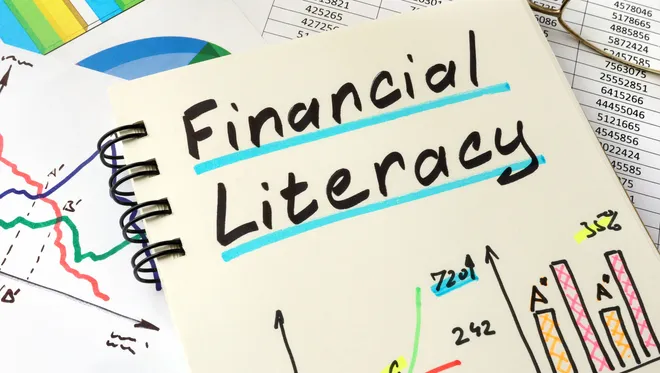Introduction
Financial freedom is about taking control of your finances and building wealth over time.
The very first step on your journey to financial freedom is education, specifically Financial Education. You need to understand the language of money. This chapter will provide you with essential knowledge to get started on your journey without overwhelming you with too much information.
Essential Financial Vocabulary
Let’s start by enumerating the various aspects of money and its management in order to grasp these essential concepts:
👉🏽 NOTE: Please take some time to familiarize yourself with these terms and their examples here https://reclaimurlife.com/essential-financial-vocabulary.
The Origins of Money
Basics of Economics
Interest
Inflation
Compound Interest
Taxes
Banking
Emergency Fund
Retirement Accounts
Securities
Stocks
Bonds
Mutual Funds
ETFs
Real Estate
Other Asset Classes
Diversification
Liquidity
Asset Allocation
Risk vs. Return
Credit Score
Debt-to-Income Ratio (DTI)
Accounting
💡 Real-World Examples
On our online portal ReclaimUrLife.com, we are maintaining an online version of this Financial Freedom Framework. The portal takes this eBook to the next level by enhancing each of the topics with links to Discussions, Articles or Resources pointing you to real-life examples of how these concepts are implemented in real life by folks who have already achieved success in their Finanancial Independence journeys.
Hopefully with this combination of knowledge and real-world application you’ll see how financial literacy translates into practical action and it could be the key to unlocking your own financial freedom.
Why Financial Literacy
Understanding the terms we’ve listed above is the first step because they’re the building blocks of financial literacy and it empowers you to plan for the future, make informed decisions, avoid financial pitfalls and build wealth thereby taking you closer to your financial freedom goals.
Money & The Economy: Knowing the history of money (The Origins of Money) and how economies function (Basics of Economics) helps you understand the bigger financial picture.
Growing Your Money: Terms like Interest, Inflation, and Compound Interest explain how money can grow over time through saving and investing. Taxes impact your income, so understanding them is crucial.
Saving & Investing Vehicles: Banks (Banking) provide safe places to store your money and potentially earn interest. Securities like Stocks, Bonds, Mutual Funds, and ETFs represent ownership or loans to companies and governments and can be used to invest for growth. Real Estate and Other Asset Classes are additional ways to invest and diversify your holdings.
Managing Risk & Return: Diversification (spreading your investments across different asset classes) and understanding the relationship between Risk vs. Return (higher potential returns typically come with higher risk) are essential for creating a sound investment strategy.
Financial Responsibility: Building a good Credit Score and maintaining a healthy Debt-to-Income Ratio (DTI) are important for qualifying for loans and managing debt responsibly.
Financial Knowledge is Power: Finally, understanding Accounting basics allows you to interpret financial statements and make informed investment decisions.
Seeking Professional Advice
In my opinion, while self-education is the most important factor that will contribute to your financial success, there are times when professional guidance could make a significant difference in your financial journey. My experience is to seek advice, glean from it and then, if possible, try to implement it yourself.
When to Seek Help
- Planning for a major life event, such as retirement or buying a home.
- Managing complex financial situations like tax planning or estate planning.
- Wanting personalized investment advice tailored to your risk tolerance and goals.
Types of Financial Professionals
- Financial Advisors: Provide comprehensive financial planning and investment advice.
- Certified Public Accountants (CPAs): Offer tax planning and preparation services.
- Estate Planners: Help you plan the distribution of your assets after your death.
- Insurance Agents: Assist with selecting the right insurance policies to protect your assets.
How to Choose a Financial Advisor
- Credentials: Look for certified professionals, such as Certified Financial Planners (CFPs) or Chartered Financial Analysts (CFAs).
- Experience: Choose someone with experience relevant to your financial needs.
- Fee Structure: Understand how the advisor is compensated – whether it’s fee-only, commission-based, or a combination.
- References: Check reviews and ask for references to ensure the advisor has a good track record.
Other Resources for Financial Education
Leverage the power of the Internet to dig further into any of the topics as needed. Here are some Resources that you could use in your free time to glean ideas and perspectives on the topics of Money and Financial Independence. I’ll keep on enhancing this section based on my own new insights and feedback received from our community over time.
Books:
- “Rich Dad Poor Dad” by Robert Kiyosaki: Offers fundamental insights into money management and investing.
- “The Total Money Makeover” by Dave Ramsey: Provides a step-by-step plan to get out of debt and build wealth.
Podcasts:
- “The Dave Ramsey Show”: Focuses on debt elimination and building wealth.
- “BiggerPockets Podcast”: Offers insights into real estate investing and financial independence.
Blogs and Websites:
- Investopedia: A comprehensive resource for understanding financial terms and concepts.
- NerdWallet: Provides practical advice on personal finance, including credit cards, banking, and investing.
Financial Planning Tools & Calculators
Here is our growing list of Tools & Calculators Financial Planning Tools & Calculators – reclaimurlife.com
Conclusion
Educating yourself financially is an ongoing process, but starting with these basics will set you on the right path. Continuously learning, seeking out resources, and knowing when to ask for professional help are key components of achieving financial freedom. Stay informed, stay disciplined, and your financial knowledge will grow, helping you make better decisions and move closer to your goals.
Previous: None
Table of Contents: Financial Freedom Framework


Responses